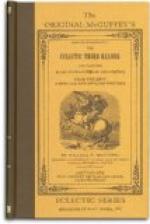Third reader. 33 10. The fur of the beaver is highly prized. The men who hunt these animals are called trappers. 11. A gentleman once saw five young beavers playing. They would leap on the trunk of a tree that lay near a beaver dam, and would push one another off into the water.
12. He crept forward very cautiously, and was about to fire on the little creatures; but their amusing tricks reminded him so much of some little children he knew at home, that he thought it would be inhuman to kill them. So he left them without even disturbing their play.
3,3
34 Eclectic series.
Lesson X.
THE YOUNG TEACHER.
1. Charles Rose lived in the country with his father, who taught him to read and to write. 2. Mr. Rose told his son that, when his morning lessons were over, he might amuse himself for one hour as he pleased. 3. There was a river near by. On its bank stood the hut of a poor fisherman, who lived by selling fish. 4. His careful wife kept her wheel going early and late. They both worked very hard to keep themselves above want. 5. But they were greatly troubled lest their only son should never learn to read and to write. They could not teach him themselves, and they were too poor to send him to school. 6. Charles called at the hut of this fisherman one day, to inquire about his dog, which was missing.
Third reader. 35 7. He found the little boy, whose name was Joe, sitting by the table, on which he was making marks with a piece of chalk. Charles asked him whether he was drawing pictures.
8. “No, I am trying to write,” said little Joe, “but I know only two words. Those I saw upon a sign, and I am trying to write them.” 9. “If I could only learn to read and write,” said he, “I should be the happiest boy in the world.”
36 Eclectic series. 10. “Then I will make you happy,” said Charles. “I am only a little boy, but I can teach you that. 11. “My father gives me an hour every day for myself. Now, if you will try to learn, you shall soon know how to read and to write.” 12. Both Joe and his mother were ready to fall on their knees to thank Charles. They told him it was what they wished above all things. 13. So, on the next day when the hour came, Charles put his book in his pocket, and went to teach Joe. Joe learned very fast, and Charles soon began to teach him how to write. 14. Some time after, a gentleman called on Mr. Rose, and asked him if he knew where Charles was. Mr. Rose said that he was taking a walk, he supposed. 15. “I am afraid,” said the gentleman, “that he does not always amuse himself thus. I often see him go to the house of the fisherman. I fear he goes out in their boat.” 16. Mr. Rose was much troubled. He had told Charles that he must never venture on the river, and he thought he could trust him.




